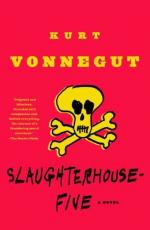|
This section contains 259 words (approx. 1 page at 400 words per page) |

|
The 1960s produced a string of novels of the absurd that reflect the bleakness of a time when unabated optimism was checked by the assassinations of President John F. Kennedy in 1963 and of Robert Kennedy and Martin Luther King, Jr., in 1968. By the end of the decade, the Vietnam War had reached its height, and the mood of the country had sunk to one of abject pessimism.
Many people believed that society had gone berserk and that a few world leaders exercised control over the destiny of millions. Vonnegut's expressed theme in Slaughterhouse-Five is the madness of war. In his novel he uses the senseless bombing of Dresden as the symbol of such madness, but he has stated that his purpose in writing the novel was to make Americans more aware of the absurdity of the Vietnam War. Vonnegut consciously wanted to avoid writing a novel...
|
This section contains 259 words (approx. 1 page at 400 words per page) |

|




